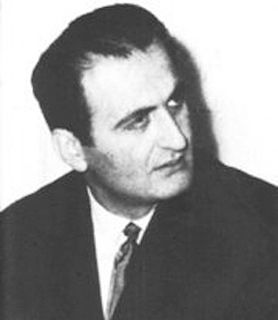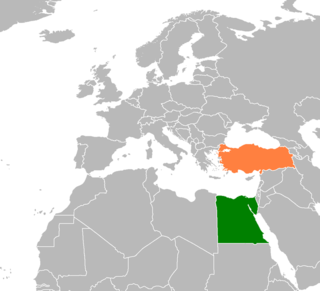
Salah Jadid was a Syrian general, a leader of the left-wing of the Arab Socialist Ba'ath Party in Syria, and the country's de facto leader from 1966 until 1970, when he was ousted by Hafez al-Assad's Corrective Movement.

Egyptian–Turkish relations are bilateral relations between Egypt and Turkey. Egypt and Turkey are bound by strong religious, cultural and historical ties, but diplomatic ties between the two have remained extremely friendly at times and extremely strained at others. For three centuries, Egypt was part of the Ottoman Empire, whose capital was Istanbul in modern-day Turkey, despite governor of Egypt, Muhammad Ali, waged war against the Ottoman sultan, Mahmud II, in 1831.

The United Arab Emirates has an embassy in Damascus, and Syria has an embassy in Abu Dhabi and a consulate-general in Dubai. Both countries are part of the Middle East region and share close cultural ties.

This is a broad timeline of the course of major events of the Syrian civil war. It only includes major territorial changes and attacks and does not include every event.

Abdel Fattah Saeed Hussein Khalil el-Sisi is a retired military officer and Egyptian politician who has served as the sixth and current president of Egypt since 2014. From 2019 to 2020, he also served as chairperson of the African Union.

Foreign involvement in the Syrian Civil War refers to political, military and operational support to parties involved in the ongoing conflict in Syria that began in March 2011, as well as active foreign involvement. Most parties involved in the war in Syria receive various types of support from foreign countries and entities based outside Syria. The ongoing conflict in Syria is widely described as a series of overlapping proxy wars between the regional and world powers, primarily between the US and Russia as well as between Iran and Saudi Arabia.

Egypt–Syria relations refers to the bilateral relations between the Arab Republic of Egypt and the Syrian Arab Republic. Egypt has an embassy in Damascus. Syria has an embassy in Cairo.
A number of states and armed groups have involved themselves in the ongoing Syrian Civil War as belligerents.

Saudi Arabia–Syria relations refer to diplomatic and economic relations between Saudi Arabia and Syria. Diplomatic ties between these two countries of the Middle East have long been strained by the major events in the region. Relations between Saudi Arabia and Syria deteriorated further following the Syrian Civil War and Saudi Arabia's numerous calls for Bashar Assad to be removed from power. Saudi Arabia cut off relations with Syria after they decided to close its embassy in Damascus and expel the Syrian ambassador in 2012.

Turkey's involvement in the Syrian civil war began diplomatically and later escalated militarily. Initially, Turkey condemned the Syrian government at the outbreak of civil unrest in Syria during the spring of 2011; the Turkish government's involvement gradually evolved into military assistance for the Free Syrian Army in July 2011, border clashes in 2012, and direct military interventions in 2016–17, in 2018, in 2019, and in 2020. The military operations have resulted in the Turkish occupation of northern Syria since August 2016.

AANES–Syria relations concern the military and political relations between the Ba'athist Syrian Arab Republic and the Autonomous Administration of North and East Syria (NES), a de facto autonomous multi-ethnic region in northern and eastern Syria. The Syrian government does not officially recognise the autonomy of the AANES, and advocates a centralist approach to the governance of Syria. The NES seeks the federalisation of Syria. For most of the Syrian civil war, there has been a non-aggression pact between the military of Syria and the Syrian Democratic Forces, with occasional confrontations and some cooperation against Islamist groups, in particular against the Turkish Armed Forces and the Turkish-backed Syrian National Army.

The Syrian Democratic Forces (SDF) is the official defence force of the Autonomous Administration of North and East Syria (AANES). An alliance of forces formed during the Syrian civil war composed primarily of Kurdish, Arab, and Assyrian/Syriac, as well as some smaller Armenian, Turkmen and Chechen forces. It is militarily led by the People's Protection Units (YPG), a Kurdish military force, and also includes several ethnic militias, as well as elements of the Syrian opposition's Free Syrian Army. Founded in October 2015, the SDF states its mission as fighting to create a secular, democratic and federalised Syria. Purportedly, the Syrian Democratic Forces has direct links to the PKK.
Saudi Arabia's involvement in the Syrian Civil War involved the large-scale supply of weapons and ammunition to various rebel groups in Syria during the Syrian Civil War.

The Syrian National Resistance was an officially independent political coalition active in Aleppo Governorate and allied with both the Syrian Ba'athist government as well as the Syrian Democratic Forces. It was primarily fighting against the Turkish military intervention in Syria, although it was also opposed to various Islamist groups such as the Islamic State of Iraq and the Levant. The launch was announced on 6 September 2016 by Rezan Hedo, the head of the group’s political bureau. At that time Hedo was also an independent member of the Syrian Democratic Council.

The Northern Democratic Brigade is a Free Syrian Army unit that is closely allied to the Syrian Kurdish YPG and YPJ in Afrin Region since 2014. Led by Absi Taha, Alexander Khalil, and Alexander Alaa, it also joined the Syrian Democratic Forces (SDF) in November 2015. The initial members of the group originated from Jabal Zawiya in Idlib, and it has recruited Arabs from Idlib, Aleppo, and other cities in northern Syria since allying with the YPG. Since joining the SDF, the unit has begun to operate across much of northern and eastern Syria, participating in operations against anti-SDF Syrian opposition factions, the Islamic State of Iraq and the Levant, the Turkish Armed Forces, and the Syrian National Army.

The Qatar–Saudi Arabia diplomatic conflict refers to the ongoing struggle for regional influence between Qatar and the Kingdom of Saudi Arabia (KSA), both of which are members of the Gulf Cooperation Council (GCC). It is sometimes called the New Arab Cold War. Bilateral relations relations are especially strained since the beginning of the Arab Spring, that left a power vacuum both states sought to fill, with Qatar being supportive of the revolutionary wave and Saudi Arabia opposing it. Both states are allies of the United States, and have avoided direct conflict with one another.
The following is a timeline of the Syrian Civil War from September to December 2018. Information about aggregated casualty counts is found at Casualties of the Syrian Civil War.
The following is a timeline of the Syrian Civil War from January to April 2019. Information about aggregated casualty counts is found at Casualties of the Syrian Civil War.
2010s in Syria political history refers to events during the 2010s in political history of Syria.
The following is a timeline of the Syrian Civil War from September–December 2019. Information about aggregated casualty counts is found at Casualties of the Syrian Civil War.













